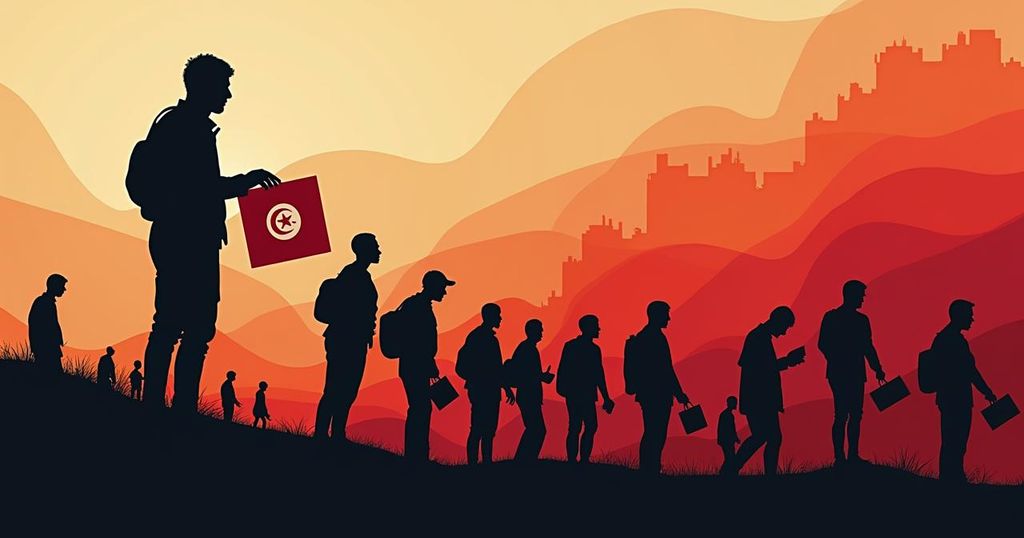Tunisia: Presidential Elections Amidst Political Repression and Economic Difficulties

Tunisia is conducting a presidential election viewed as likely to secure a second term for President Kais Saied. His main opponents are imprisoned, and concerns about electoral fairness have led to calls for a boycott from opposition parties. Despite being hailed as the sole success of the Arab Spring, Tunisia now grapples with political repression and economic challenges, while the international community maintains varied relations with Saied’s government.
Tunisia conducted a presidential election on Sunday, likely positioning President Kais Saied for a second term, amidst a political landscape heavily marred by the imprisonment of his main opponents. President Saied, now 66 years old, seeks reelection five years after capitalizing on widespread dissatisfaction toward the establishment that granted him his first term, during which he notably suspended Parliament and redefined the Constitution to increase presidential authority. This election marks the third since the monumental 2011 protests that led to the ousting of long-time autocrat Zine El Abidine Ben Ali, a significant event in the Arab Spring movement, which subsequently resulted in transitions of power in various North African and Middle Eastern nations. While the preceding electoral processes received commendations from international monitors for adhering to democratic standards, this year’s elections have sparked scrutiny due to numerous arrests and actions taken by an election authority appointed by Saied that have raised concerns regarding the integrity of the electoral process. Consequently, many opposition factions have called for a boycott. Historically viewed as the single success story of the Arab Spring, Tunisia has since grappled with a succession of political and economic tribulations. While a new democratic constitution was established and various civil society organizations received the Nobel Peace Prize for their role in fostering collaborative governance, the ruling figures have struggled to revitalize the faltering economy, plagued by inter-party conflicts and incidents of violence. President Saied, an outsider at the forefront in 2019, positioned himself as a reformer promising rejuvenation for Tunisia while empowering youth and local administrations. As Tunisia’s electorate examines the electoral competition this year, there appears to be a split among the populace regarding the direction of the country’s democracy since Saied’s rise to power. Although he maintains a faction of supporters loyal to his agenda of transformation, his lack of affiliation with a formal political party generates uncertainty as to his overall popularity among citizens. This election will be the first since Saied’s decisive steps in July 2021 to alter Tunisia’s political framework by declaring a state of emergency, dismissing the prime minister, suspending the parliament, and revising the Constitution to consolidate his authority. Such maneuvers elicited outrage from pro-democracy activists and opposition factions who branded them a coup d’état. Nevertheless, in a subsequent referendum with low voter turnout, Saied’s proposed Constitution was approved by the electorate. The ensuing years have witnessed a crackdown on dissent, with numerous critics—including journalists, opposition leaders, and civil rights activists—facing prison sentences on charges of threatening state security. The political atmosphere has become increasingly hostile, resulting in a drop in voter engagement during subsequent electoral exercises amid spiraling economic hardships and pervasive political disenchantment. Despite hostility toward his administration, potential challengers faced formidable barriers to participation. Out of 17 candidates who expressed intent to run, only three were allowed to campaign: President Saied, Zouhair Maghzaoui, a seasoned politician opposing Saied’s economic policies, and Ayachi Zammel, a businessman supported by non-boycotting political representatives. The latter has faced legal penalties for voting fraud instances tied to his candidacy efforts. With much of the notable opposition incarcerated, figures from the Ennahda party—once dominant in Tunisian politics—have been sidelined, including Rached Ghannouchi, the party’s leader, currently imprisoned, and Abir Moussi, who similarly faced charges for denouncing Saied. In addition to the political climate, Tunisia’s economy confronts dire challenges, with rising unemployment—reaching over 16%—particularly affecting youth. Despite an economic strategy ostensibly aimed at rejuvenation, clear policies remain elusive, and negotiations regarding a $1.9 billion International Monetary Fund (IMF) bailout have stagnated due to Saied’s resistance to the required reforms. The nation’s economic instability has incited a surge of unauthorized migration attempts to Europe, juxtaposed with a stringent crackdown on migrants entering Tunisia, particularly from sub-Saharan Africa. Additionally, Tunisia has cultivated varied international relations under Saied, navigating partnerships across traditional Western alliances as well as exploring newfound ties with countries such as Iran and China. His government retains close correspondence with European nations while rejecting the notion of being a guardian of EU migration controls. As Tunisia grapples with its internal and external challenges, the outcomes of this electoral cycle could elucidate the future trajectory of its political milieu and the extent to which the populace supports President Saied’s vision for the nation.
The article discusses the state of democracy and political dynamics in Tunisia as it heads into a presidential election where President Kais Saied is expected to secure a second term, despite a climate of repression against opposition figures. Tunisia, once celebrated as the victor of the Arab Spring, is witnessing challenges to its democratic integrity with many critics imprisoned and opposition calls for a boycott of the elections. Key issues include the political backdrop post-Arab Spring, the economic crisis faced by the country, and the implications of Saied’s governance on Tunisia’s relationships with international allies.
In summary, Tunisia’s upcoming election stands as a critical indicator of public sentiment towards President Kais Saied’s governance amidst increasing political suppression and economic adversity. His consolidation of power and the resultant incarceration of key political figures highlight significant tensions in the democratic process. As the nation confronts formidable economic challenges and shifting international relations, the electoral outcome may determine both the future of Tunisian democracy and Saied’s enduring support among the electorate.
Original Source: www.cnn.com








